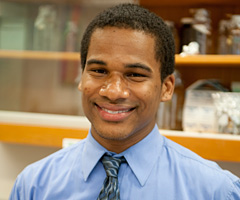A Meeting of the Minds
While cleaning out his closet on a recent visit home, Phillip Fitzgerald found a box of old awards. Flipping through certificates and plaques for various achievements, he noticed a trend: Almost every award was related to science, dating all the way back to his third grade science fair. He realized science has been his life since he was a child.
“It was in the books from the beginning,”he said matter-of-factly.
This summer, Fitzgerald will continue on that path as he travels to Lindau, Germany, to participate in the 61st Meeting of Nobel Laureates. This annual gathering of leading scientists brings together about 20 Nobel prize winners and other internationally recognized scientists with 500 “young researchers” selected from a global pool of the brightest collegiate scholars.
Fitzgerald is the second UMBC student in a row to be accepted; Benyam Kinde ’10 attended the meeting last year.
A senior completing a major in biochemistry and molecular biology, Fitzgerald is also a first-generation college student from Prince George’s County, where he was valedictorian at Suitland High School.
He has flourished at UMBC from the day he was accepted into the Meyerhoff Scholars Program. The Meyerhoff program was founded to increase diversity among young leaders in science, technology and engineering fields. Fitzgerald said the program has had a big influence on him.
Fitzgerald finds a spirit of collaboration through the Meyerhoff program and throughout campus. He said UMBC offers a “safe zone,” which contrasts with the “cut-throat” environments he has seen elsewhere.
At UMBC, Fitzgerald has worked with Suzanne Ostrand-Rosenberg, professor of biological sciences and Robert and Jane Meyerhoff Chair of Biochemistry. Together they are researching tumor immunology, focusing on how inflammation and a specific type of suppressor cells can promote cancer by inhibiting the body’s immune system. Fitzgerald has also interned at the New York University School of Medicine under Dan Littman, professor of molecular immunology and a Howard Hughes Medical Institute (HHMI) investigator. There he studied how certain immune cells, called dendritic cells, can shuttle HIV to target T cells, greatly increasing HIV infection rate. Fitzgerald received this internship through HHMI on recommendation from Michael Summers, HHMI Investigator and UMBC professor of chemistry and biochemistry.
One key influence in Fitzgerald’s life was his high school biology teacher, who encouraged him to do a summer research project at the National Institutes of Health (NIH).
“It turned my love of studying science, into a love of researching science,” he said, explaining that he believes this appreciation for science should be shared.
Fitzgerald is a tutor in the chemistry tutorial center, and he has been a teaching assistant for introductory biology. He also volunteers at Prince George’s Tennis and Education Foundation, a non-profit that provides opportunities for young people to excel academically, athletically and socially through tennis. Fitzgerald said he has more to offer with Bunsen burners and Erlenmeyer flasks than he does with a racket.
With all this on his plate, Fitzgerald still finds time for himself to unwind with his other talents. Fitzgerald is learning to play the piano and guitar, while also taking singing lessons. He says this is a treat to himself for his last semester at UMBC. It is an artistic release that he hopes will benefit him as he pursues a joint M.D./Ph.D. at Johns Hopkins University.
“Success is when you reach a point in life where with whatever you’re doing you find happiness in doing it, whether that is career based or not,” Fitzgerald said. “It is not in correlation with income or number of degrees; a successful person is someone who can wake up and be excited for what they are going to do that day.”
He has big plans for his career in biochemistry, and he said UMBC has been just the place to put him on this path.
“UMBC has supported my passion for scientific research so much through its emphasis on research and giving hands-on training,” he said.
He remembers the overwhelming feeling of getting accepted into the Nobel Laureate meeting in Lindau.
“It means,” he said, “there are people out there that are seeing potential in me.”
(4/29/11)

